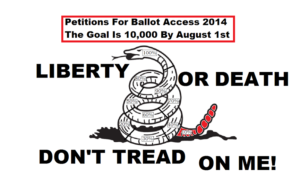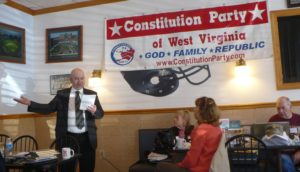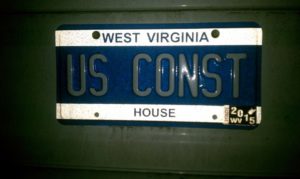We are on our way to ballot access for the General Election this year. Help us get our lead candidate Phil Hudok in the race for U.S. Senate. Please visit his campaign website at the following link for specific information on WHAT YOU CAN DO, or better yet, give us a call! http://hudok.com/index.php/sign-petition/ 
Phil Hudok speaks at TEA Party meetings
 On Friday, November 8, U.S. Senate candidate Phil Hudok gave an informative PowerPoint presentation to the Hampshire County TEA Party in Romney. The presentation outlining the signs of the times included audio/video of the float which he designed that features a 7 and 1/2 foot high smoke-ring blowing Obama head. He explained how Article 2, Section 1 of the U.S. Constitution was not being followed and how a return to the “Rule of Law” could undo the recent damage inflicted on the “Republic” by Mr. Obama and his globalist handlers.
On Friday, November 8, U.S. Senate candidate Phil Hudok gave an informative PowerPoint presentation to the Hampshire County TEA Party in Romney. The presentation outlining the signs of the times included audio/video of the float which he designed that features a 7 and 1/2 foot high smoke-ring blowing Obama head. He explained how Article 2, Section 1 of the U.S. Constitution was not being followed and how a return to the “Rule of Law” could undo the recent damage inflicted on the “Republic” by Mr. Obama and his globalist handlers.
 Previously, Phil had given his presentation to the Nicholas County TEA Party (October 29, 2013) and also at the God and Country rally in Elkins on July 4th
Previously, Phil had given his presentation to the Nicholas County TEA Party (October 29, 2013) and also at the God and Country rally in Elkins on July 4th
MORGANTOWN MEETING October 26
 On the last Saturday in October, the CPWVa will be holding our bi-annual election of state party officers. This meeting will also feature DYNAMIC guest speaker, and noted publisher Joel T. LeFevre on the topic of “SECESSION – IRREFUTABLE PROOF that it was and still is is legal.”
On the last Saturday in October, the CPWVa will be holding our bi-annual election of state party officers. This meeting will also feature DYNAMIC guest speaker, and noted publisher Joel T. LeFevre on the topic of “SECESSION – IRREFUTABLE PROOF that it was and still is is legal.”
WiFi and video presentations by:
* U.S. Senate candidate Phil Hudok (featuring a report on the Mr. Obamahead smoke-blowing parade float), and
* Lou Manley on the topic of our MISSING STATE CONSTITUTION. Freedom of Information requests to public officials are being ignored and even museum curators and state legislators cannot find the original signed document. This is a BREAKING STORY!!
We expect to have our new line of attractive custom apparel (T-shirts, long-sleeves, sweatshirts) available just in time for the crisp autumn weather.
Introduction of our growing slate of 2014 candidates. The Constitution Party of West Virginia IS ON THE MOVE!! The meeting is free, but food and drinks (no purchase required) are the responsibility of our guests.DATE: Saturday, October 26, 2013
TIME: noon to 5pm
LOCATION: SHONEY’S RESTAURANT, MORGANTOWN
DIRECTIONS: Use the I-79 Star City exit. Any questions, call or email us at (304) 591-7076, info@cpwva.org
Community Decency Platform Updated
In response to today’s misguided Supreme Court decision, the Executive Committee of the Constitution Party of West Virginia, in meeting duly assembled, has made the following revisions (as indicated below in bold text) to its platform position on “Community Decency.”
The US Supreme Court was wrong in 1857 in the Dred Scott Case. The same court was wrong in 1893 in Plessy v. Fergusson. And they were wrong in 1973 with Roe v. Wade. They are wrong today. Their word is not the last word, God’s Word is: “Because a sentence against an evil work is not executed speedily, therefore the heart of the sons of men is fully set in them to do evil.†– Ecclesiastes 8:11
Community Decency – revised
John Adams said “Our Constitution was made only for a moral and religious people. It is wholly inadequate to the government of any other.†To which his cousin Sam added, “While the people are virtuous they cannot be subdued; but once they lose their virtue they will be ready to surrender their liberties to the first external or internal invader,†and “if we are universally vicious and debauched in our manners, though the form of our Constitution carries the face of the most exalted freedom, we shall in reality be the most abject slaves.†These sentiments echo those of over a century earlier when John Milton, in his classic novel, Paradise Lost, narrated man’s fall from Grace and subsequent need to be obedient to Gods laws of Holy Scripture. “So many and so various laws are giv’n; So many laws argue so many sins,†said Milton.
What, then, is public virtue? It is clear from the writings of our founders that they intended temperance within the bounds of natural law in the establishment of a republican form of government rather than a theocracy. The most promising method of securing a virtuous and morally stable people is to elect virtuous leaders. As such, the CPWVa maintains that the State and local governments have the right and legitimate authority to restrict and prohibit obscenity and obscene material in any format and local establishments in accordance with community standards of morality and decency. To wit, we specifically address community decency in the areas of pornography, homosexuality, and gambling.
Pornography and homosexuality are a distortion of the true nature of sex created by God for the procreative union between one man and one woman in the holy bonds of matrimony. They are destructive elements of society resulting in significant and real emotional, physical, spiritual and financial costs to individuals, families and communities. Until 1973, the American Psychiatric Association correctly regarded homosexuality as a mental disorder, and thus schools and the military have every right to prohibit persons with this condition from their ranks. The same is true for the gender confused. It is abominable that homosexual radicals, aided and abetted by the corporate media, promote this sinful behavior as normal and harmless through the perversion of our language by calling it “gay†and using the rainbow as their symbol. This is nothing more than deceptive trickery to corrupt the innocent.
We reject the notion that sodomites and sexual offenders are deserving of legal favor or special protection, and affirm the rights of states and localities to proscribe offensive sexual behavior. We oppose all efforts to impose a new sexual legal order through the federal court system. We stand against so-called “sexual orientation” and “hate crime” statutes that attempt to legitimize inappropriate sexual behavior and to stifle public resistance to its expression. We oppose government funding of “partner” benefits for unmarried individuals. We oppose any legal recognition of homosexual unions and seek to prohibit homosexuals from adopting children. Legal marriage is between one man and one woman.
While we fully respect the constitutionally protected right to privacy of consenting adults, all sexually suggestive material must be kept as far away and out of reach from children as possible. This includes the location of men’s clubs, library and store books, and the content of public airwaves. Likewise, while we fully respect the constitutionally protected right to freedom of speech, consideration must be given to undesired exposure to racy public advertising and offensive or suggestive attire and behavior. This includes the appearance of road signs, promiscuous clothing styles and slogans, vehicle decorations, profanity, graffiti, and general blight.
Gambling promotes an increase in crime, destruction of family values, and a decline in the moral fiber of our country. We are opposed to government sponsorship, involvement in, or promotion of gambling in the name of economic development or for any other purpose.
Berkeley County Organizing Meeting
 MARCH FORTH with the Constitution Party in Berkeley County. Join us for our fourth (4th) organizing meeting on Monday, March 4 at Hoss’s Restaurant in Martinsburg (Eastern Panhandle) at 7:00pm. Our previous meetings there were January 26, and February 12th and 18th. For more information, check out our event page on Facebook at https://www.facebook.com/events/559891600696438/ Supporters from ALL SURROUNDING COUNTIES and even out of state are welcome. Previous meetings have had guests from Maryland, Pennsylvania, and Virginia.
MARCH FORTH with the Constitution Party in Berkeley County. Join us for our fourth (4th) organizing meeting on Monday, March 4 at Hoss’s Restaurant in Martinsburg (Eastern Panhandle) at 7:00pm. Our previous meetings there were January 26, and February 12th and 18th. For more information, check out our event page on Facebook at https://www.facebook.com/events/559891600696438/ Supporters from ALL SURROUNDING COUNTIES and even out of state are welcome. Previous meetings have had guests from Maryland, Pennsylvania, and Virginia.
License Plates: Who's is Coolist?
US Senate Candidate Phil Hudok Inspires 2nd Amendment Resolution
Constitution Party 2014 U.S. Senate candidate Phil Hudok gave presentations to the Randolph County Commission and Board of Education regarding the proper interpretation and need for our Second Amendment. These actions have now resulted in a formal resolution by the Commission to members of Congress. Below is a link to an article in the InterMountain about this. THANK YOU PHIL !!
Here is an excerpt:
Randolph County Commissioners decided to take a stand on the 2nd Amendment Thursday, passing a resolution supporting the right to “keep and bear arms.” The measure will be sent to elected officials.
Commission President Chris See said the resolution was created after resident Phil Hudok spoke to the commission about gun control measures.
“We came up with this resolution and we will send it to Sen. Joe Manchin (D-W.Va.,) and Congresswoman Shelley Moore Capito (R-W.Va.),” See said before reading the resolution.
The resolution states that it is the right of the people to “keep and bear arms for the defense of life, liberty and property,” and that the right is regarded as an “inalienable right by the people of Randolph County.”
http://www.theintermountain.com/page/content.detail/id/559185/Randolph-Commission-passes-gun-resolution.html?nav=5014
Animals Platform Position Adopted
At it’s October 31, 2012 meeting, the Executive Committee of the CPWV adopted the following platform position:
We support the responsible and humane use of animals for food, clothing, medical research, companionship, assistance, recreation, entertainment, and education. It is our belief that people who keep, utilize and care for animals have a duty to assure their well-being; providing appropriate housing, nutrition, medical care, humane treatment and handling, and when necessary, humane euthanasia.
The ethical and regulated hunting, trapping, and fishing of abundant species are vital components of wildlife management programs which help sustain and perpetuate healthy populations and natural habitats. While we support the enforcement of state and local laws which maintain ecological conservation, prohibit mistreatment, and provide penalties for animal abuse, we only recognize the authority of similar federal laws on legitimate federal lands. We support laws that punish animal abusers for their misdeeds, and reject legislation that seeks to penalize everyone, responsible animal owners and industries alike, for the misconduct of the few.
We reject the anti-human philosophy of the so-called “animal rights” movement which often places the interests of animals ahead of people, even when human lives are at stake. Furthermore, we reject legal standing for animals, believing that the welfare of animals is best protected by retaining current laws which recognize animals as property. We are committed to preserving the human-animal bond, the special bond that exists when people live and work with animals and believe that campaigns to limit and ultimately abolish this interaction are unnatural, misguided and harmful to both people and animals. The sensational use of media campaigns to promote radical animal policies undermines the democratic process by promoting a misinformed electorate.
Happy Constitution Day!
 On this day in 1787 in Philadelphia, the Constitution for the united States of America was signed by delegates from twelve states (Rhode Island and Providence Plantations did not send any delegates). Written on four pages plus the transmittal page (finally on display at the National Archives), it is concise, straightforward, and easy to read by the common man. Read it today. Read it any day. Get a pocket Constitution and Declaration of Independence to keep it handy. Also get a copy of the Federalist Letters which is a compilation of newspaper articles written in defense of our Constitution (by founders John Jay, Alexander Hamilton, and James Madison), as well as the Anti Federalist Letters which challenged it. Many in-depth study courses are available for those interested in exploring the nuances of this founding document. We suggest that you explore this as a family or group project with like-minded friends and neighbors. Make every day Constitution Day!
On this day in 1787 in Philadelphia, the Constitution for the united States of America was signed by delegates from twelve states (Rhode Island and Providence Plantations did not send any delegates). Written on four pages plus the transmittal page (finally on display at the National Archives), it is concise, straightforward, and easy to read by the common man. Read it today. Read it any day. Get a pocket Constitution and Declaration of Independence to keep it handy. Also get a copy of the Federalist Letters which is a compilation of newspaper articles written in defense of our Constitution (by founders John Jay, Alexander Hamilton, and James Madison), as well as the Anti Federalist Letters which challenged it. Many in-depth study courses are available for those interested in exploring the nuances of this founding document. We suggest that you explore this as a family or group project with like-minded friends and neighbors. Make every day Constitution Day!
Convention Event on Facebook
Join us on Facebook at our event page created for our convention.
https://www.facebook.com/events/333873393370968

